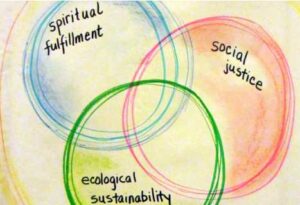The need for community has come to my attention in a myriad of ways recently. Yes, we humans have some basic needs like air, food, water, shelter, sanitation, clothing, sleep, and shelter. Then if we look at safety there are needs there personally, emotionally, financially, and our health and wellbeing. There is a need for social belonging and interaction with family, friends, and intimate partners. But one of the greatest needs at this time in history is the need for community. All aspects of our life – physical, emotional, mental, and spiritual- call for deeper relationships to foster healthy living.
Through various programs I facilitate or participate in, I am seeing the value of community. The community needs to have a clear identity and purpose and the members of the group need to identify with the other members. That way they can exert influence towards what the group’s focus is. What they are trying to achieve. Through community, there is communication and a sharing of ideas. Community can be a place where there is listening, clarity, concern, friendliness, respect, and feedback. It can be a place of growth both for the individual and the group’s focus.
Once there is a shared identity and a purpose in the community, individuals will each bring their personal strengths and passions to help the group meet its objectives. Everyone will benefit from their gifts and the world is a better place because of it.
Where we find community is highly individual and depends on what our passions are.
Community sustains us and can give us hope. One such community is the Unify Toronto community. This community brings together The Awakening the Dreamer community and the Drawdown community. What all these groups have in common is working together to create an environmentally sustainable, socially just and spiritually fulfilling human presence on the planet.
On Saturday I facilitated a group of people through Awakening the Dreamer Changing the Dream. We all got to question our long-held beliefs and traditional ways of doing things as a painful but necessary step in the process of getting to a place of hope. We went through a process that took us through our overwhelm to awareness and into action. We discussed new ideas using the collective wisdom of the group. We saw how our divergent world views and lenses meant that we all approached the exact same problem slightly differently.
We witnessed how it is not easy going through difficult times alone and how we need community for motivation, support and belief. When the big goals seem impossible, when we want to give up, we have the community to lean on. Being part of a community can inspire us on those days when our belief is being challenged or we are feeling overwhelmed. The other beautiful thing about community is that the community believes in you – probably more than you believe in yourself. Community can also provide accountability to others if you need it.
I love that community is available to us as we are living in troubled times and I see community as a way to sustain and support us through these times. If you are at all interested in creating an environmentally sustainable, socially just and spiritually fulfilling human presence on the planet and want to join a community of like-minded souls, then please contact me.
To your good health,
Charlene Day
To learn more you can read more of my blogs on this:





